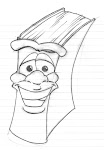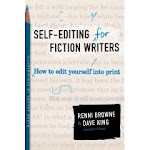Let's talk about dialogue. Sometimes we get so caught up in our dialogue that we forget to add beats of action, internal monologue and descriptions of the scene. This leaves us with dialogue where the characters sound like they're in a rush, and by the time we get to the end, we (the reader) feel out of breath.
Some writers tend to put all the important information into one paragraph. This is what I call an information dump. Instead, what we need to do is sprinkle the information throughout the text.
Allow me to provide a before and after example of how we can do this.
In the following example, we'll read what dialogue sounds like without any beats of action or internal monologue and very little descriptions of the scene. The following excerpt is taken from a historical western. We're in Anna's point of view in a dining car on a train.
BEFORE:
“May I join you?" the man asked. "There are no available tables in this car, and I see you are nearly finished.”
“Oh yes, please, sit down."
“The name's Steven Kane.”
Anna introduced herself, then stood and prepared to gulp down the rest of her tea.
“No need to rush. Take your time, enjoy your tea.” The man sat across from her.
“Thank you.” She settled back into her seat and tried to relax.
“And what’s your destination, if I may ask?”
“Denver City.”
“That’s where I’m going. So, you’ll be taking the stage from Julesburg.”
“No. I’ll be taking the stagecoach from Cheyenne.”
“Cheyenne? There’s nothing in Cheyenne. Why would you go that route? Are you meeting someone?”
“I was told in New York that I could take a coach from Cheyenne to Denver. It’s much closer, isn’t it? I mean, closer than Julesburg is to Denver City.”
“Hmmm. I suppose you’re right, it is closer. But you still have to go a ways on the train, and I know for a fact that the service from Julesburg is much faster. The stagecoach from Julesburg to Denver City has won competitions for its speed. You could get off with me. I can assure your safety. That is, if you’re not meeting someone.”
“Thank you for your kind offer, Mr. Kane, but I’m meeting my fiancé.” With that, she stood and bid him good day.
***
If you're not out of breath by this time, then you're likely bored out of your mind. Let's see how much richness we can add to our prose by breaking up our dialogue with some action and internal monologue. Not only that, notice how the added detail tells another part of the story.
AFTER:
Several days later and long past Chicago, Anna sat in the dining car, watching the scenery unfold before her eyes. The landscape spread out for miles. Occasionally, she’d spot a small farm or a ranch, but most of the land was wide-open spaces with fields and rolling hills of yellow, brown and green. She sipped her tea, noticing the empty plate before her. She hadn’t eaten this well in a long time.
“May I join you?”
She looked up.
A young gentleman with a black handlebar mustache stood next to her table. He smiled, put his hands behind his back and rocked on his feet. “There are no available tables in this car, and I see you are nearly finished.”
“Oh yes, please, sit down,” she said, ashamed she hadn’t spoken sooner.
“Steven Kane.” He tipped his hat.
Anna introduced herself, then stood and prepared to gulp down the rest of her tea.
“No need to rush. Take your time, enjoy your tea.” The man sat across from her.
“Thank you.” She settled back into her seat and tried to relax. She’d never shared a table with a man before.
“And what’s your destination, if I may ask?”
“Denver City.”
“That’s where I’m going.” The man’s smile broadened. “So, you’ll be taking the stage from Julesburg.”
Puzzled, she glanced up at him. “No. I’ll be taking the stagecoach from Cheyenne.”
“Cheyenne? There’s nothing in Cheyenne. Why would you go that route?” His brows rose in question. “Are you meeting someone?”
She took a sip from her tea. She didn’t want him to know she wasn’t meeting anyone, and yet, what if she were about to get off at the wrong stop?
“I was told in New York that I could take a coach from Cheyenne to Denver.” She cleared her throat, trying not to sound too ignorant. “It’s much closer, isn’t it? I mean, closer than Julesburg is to Denver City.” She recalled all her studies of the railroads, and where they were being built, and according to the map, Cheyenne was definitely closer to Denver.
“Hmmm.” Mr. Kane rubbed his chin. “I suppose you’re right, it is closer. But you still have to go a ways on the train, and I know for a fact that the service from Julesburg is much faster. The stagecoach from Julesburg to Denver City has won competitions for its speed.”
His eyes swept over her and back to her face. “You could get off with me. I can assure your safety. That is, if you’re not meeting someone.”
She forced a smile, shifting uncomfortably under his gaze. “Thank you for your kind offer, Mr. Kane, but I’m meeting my fiancé.” With that, she stood and bid him good day. Her conscience bothered her dreadfully for having told such a blatant lie.
***
Notice how once details are added to a scene we can now see the scene, feel it, touch it, and even taste it. It also gives us a look into the characters and their fears, struggles, triumphs. All of these things are what help us to lose ourselves in a story.
Let's play around with the dialogue below. How would you add richness to the following text? Have fun with it, and show us all the different directions a writer can take it.
"I can't."
"But it's not far."
"When you said we were going to FILL IN SPACE, I didn't know you meant this."
Sunday, February 28, 2010
Subscribe to:
Post Comments (Atom)












No comments:
Post a Comment